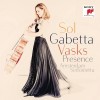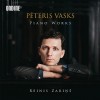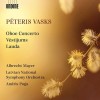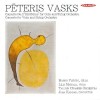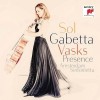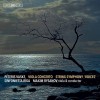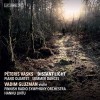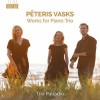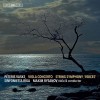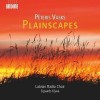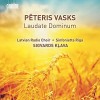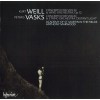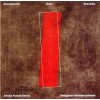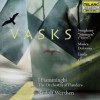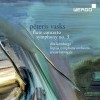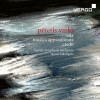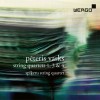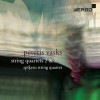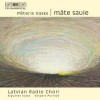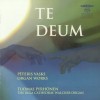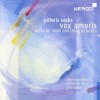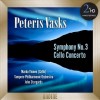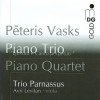Composers
Pēteris Vasks (born 16 April 1946) is a Latvian composer.
Vasks was born in Aizpute, Latvia, into the family of a Baptist pastor. He trained as a violinist at the Jazeps Vitols Latvian Academy of Music, as a double-bass player with Vitautas Sereikaan at the Lithuanian Academy of Music and Theatre, and played in several Latvian orchestras before entering the State Conservatory in Vilnius in the neighboring Lithuania to study composition with Valentin Utkin, as he was prevented from doing this in Latvia due to Soviet repressive policy toward Baptists. He started to become known outside Latvia in the 1990s, when Gidon Kremer started championing his works and now is one of the most influential and praised European contemporary composers.
Vasks' early style owed much to the aleatoric experiments of Witold Lutosławski, Krzysztof Penderecki and George Crumb. Later works included elements of Latvian folk music, such as his gentle and pastoral cor anglais concerto (1989). His works are generally extremely clear and communicative, with a solid and muscular sense of harmony. Lyrical passages may be followed by agitated dissonances, or interrupted by sombre sections with a march-like feel. He made extensive use of minimalist techniques as well, but never became a slave to any particular method.
Vasks feels strongly about environmental issues, and a sense of nature both pristine and destroyed can be found in many of his works, such as the String Quartet No. 2 (1984). Other important works include Cantabile (1979) and Musica dolorosa (1984) and "Bass Trip" (2003) for solo double bass. He has written five string quartets, the fourth (2003) and fifth (2006) of which were written for the Kronos Quartet.
Vasks was the recipient of the Vienna Herder Prize of the Alfred Toepfer Foundation in 1996 and the Latvian Grand Music Award in 1997, the latter for his violin concerto Tālā Gaisma (1996-7). He received the Cannes Classic Award in 2004. His important works also include "Viatore", Symphony #2 and "Music for a deceased Friend".
Since 1994 he has been an honorary member of the Latvian Academy of Sciences and in 2001 he became a member of the Royal Swedish Academy of Music. In 1996 he was the main composer at the Stockholm New Music Festival and in 2006 composer-in-residence at the Presteigne Festival of Music and the Arts and the Vale of Glamorgan Festival in Wales.
In 2005 he received the Order of the White Star, 3rd Class.
Recently Added
| Country: | Latvia |
| Period: | Contemporary classical music |
Biography
Pēteris Vasks (born 16 April 1946) is a Latvian composer.
Vasks was born in Aizpute, Latvia, into the family of a Baptist pastor. He trained as a violinist at the Jazeps Vitols Latvian Academy of Music, as a double-bass player with Vitautas Sereikaan at the Lithuanian Academy of Music and Theatre, and played in several Latvian orchestras before entering the State Conservatory in Vilnius in the neighboring Lithuania to study composition with Valentin Utkin, as he was prevented from doing this in Latvia due to Soviet repressive policy toward Baptists. He started to become known outside Latvia in the 1990s, when Gidon Kremer started championing his works and now is one of the most influential and praised European contemporary composers.
Vasks' early style owed much to the aleatoric experiments of Witold Lutosławski, Krzysztof Penderecki and George Crumb. Later works included elements of Latvian folk music, such as his gentle and pastoral cor anglais concerto (1989). His works are generally extremely clear and communicative, with a solid and muscular sense of harmony. Lyrical passages may be followed by agitated dissonances, or interrupted by sombre sections with a march-like feel. He made extensive use of minimalist techniques as well, but never became a slave to any particular method.
Vasks feels strongly about environmental issues, and a sense of nature both pristine and destroyed can be found in many of his works, such as the String Quartet No. 2 (1984). Other important works include Cantabile (1979) and Musica dolorosa (1984) and "Bass Trip" (2003) for solo double bass. He has written five string quartets, the fourth (2003) and fifth (2006) of which were written for the Kronos Quartet.
Vasks was the recipient of the Vienna Herder Prize of the Alfred Toepfer Foundation in 1996 and the Latvian Grand Music Award in 1997, the latter for his violin concerto Tālā Gaisma (1996-7). He received the Cannes Classic Award in 2004. His important works also include "Viatore", Symphony #2 and "Music for a deceased Friend".
Since 1994 he has been an honorary member of the Latvian Academy of Sciences and in 2001 he became a member of the Royal Swedish Academy of Music. In 1996 he was the main composer at the Stockholm New Music Festival and in 2006 composer-in-residence at the Presteigne Festival of Music and the Arts and the Vale of Glamorgan Festival in Wales.
In 2005 he received the Order of the White Star, 3rd Class.

